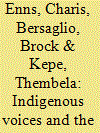| Srl | Item |
| 1 |
ID:
131356


|
|
|
|
|
| Publication |
2014.
|
| Summary/Abstract |
This paper explores recent efforts to ensure the participation of indigenous peoples in the making of the post-2015 development agenda. It is based on an examination of the UN's global consultation process, conducted between July 2012 and July 2013. Using discursive analysis of consultation findings and reports, we argue that the UN's approach to participatory development represents a pretence rather than an actual shift in power from development experts to the intended beneficiaries of development. Therefore the post-2015 consultation process aptly illustrates the recurring tyranny of participation, this time at a global level, as the UN maintains control over global development goals. Recognising that it would be unjust to ignore the ability of marginalised groups to challenge the UN's dominant narratives of development, we suggest that there is still time for indigenous voices to be heard in the build-up to the post-mdg era through 'invited' and 'uninvited' forms of participation.
|
|
|
|
|
|
|
|
|
|
|
|
|
|
|
|
| 2 |
ID:
172876


|
|
|
|
|
| Summary/Abstract |
In this article, we analyse the factors underpinning the shift towards hybrid security governance in Africa. Extant scholarship largely attributes this shift to broader global processes, such as histories of colonialism, neoliberalism and transformations in global governance, which have served to legitimize the role of private authority in security provision around sites of resource extraction. Our analysis seeks to understand the relative and relational influence of power and rules in international politics by offering empirical insights about what hybrid security arrangements look like ‘on the ground’. Drawing upon recently conducted fieldwork in Kenya, Uganda and Ghana, we examine how hybrid security arrangements affect the lives of those living near sites of natural resource extraction. Our analyses suggest that although hybrid security has emerged as the leading approach to security governance, this approach to security does not uniformly involve or serve the interests of all stakeholders. Rather, we find that hybrid security arrangements aid the security of extractive operations—securing investments in both physical and human capital—while sometimes undermining the security of nearby communities.
|
|
|
|
|
|
|
|
|
|
|
|
|
|
|
|